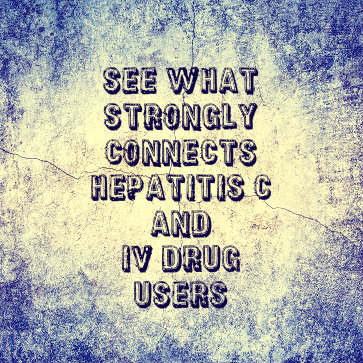What Strongly Connects Hepatitis C And IV Drug Users?
Hepatitis C is a form of serious, liver-damaging illness triggered by infection with a virus commonly known as the hepatitis C virus (HCV). Current evidence indicates that, throughout the U.S. and the rest of the world, the majority of new cases of this illness stem from the unsanitary injection of IV drugs (intravenous drugs). In a study published in June 2013 in the Harm Reduction Journal, a multi-institution research team reviewed some of the potentially overlooked factors that contribute to the ongoing connection between IV drug use and HCV infection. The researchers concluded that patient-doctor miscommunication and lack of access to required resources have a considerable impact on the reinforcement of this connection.
How Is Hepatitis C Spread?
 Hepatitis C is one of four viral diseases that get their names because they damage function inside the human liver. It is a blood-borne illness that typically occurs when an individual with HCV knowingly or unknowingly exposes others to his or her infected blood. Common routes for this exposure include intentional or accidental needle sticks or injections, as well as the accidental entry of infected blood through a cut or through the mouth. Additional, less common potential routes of exposure include mother-to-child transmission inside the womb, organ transplant procedures, kidney dialysis procedures and blood transfusions.
Hepatitis C is one of four viral diseases that get their names because they damage function inside the human liver. It is a blood-borne illness that typically occurs when an individual with HCV knowingly or unknowingly exposes others to his or her infected blood. Common routes for this exposure include intentional or accidental needle sticks or injections, as well as the accidental entry of infected blood through a cut or through the mouth. Additional, less common potential routes of exposure include mother-to-child transmission inside the womb, organ transplant procedures, kidney dialysis procedures and blood transfusions.
Hepatitis C Symptoms
The hepatitis C virus can produce either acute (short-term) infections or chronic (long-term) infections. In both cases, affected individuals often have few or no early symptoms of the changes going on inside their livers. If early symptoms do occur, they are as follows.
Early Hepatitis C Symptoms
- Jaundice
- Loss of energy
- Spikes in body temperature (i.e., fevers)
- Swelling in the abdomen
- Abdominal pain in the liver region
- Nausea and vomiting
- Declining appetite
Eventually, people affected by chronic hepatitis C can develop serious or potentially fatal cases of cirrhosis (liver scarring) or liver cancer. Roughly 75 percent to 85 percent of people who contract hepatitis C develop the chronic form of the illness.
IV Drug Use And Risky Behaviors
IV drug users have an uncommonly high rate for hepatitis C (and a number of other serious, infectious diseases) for several reasons. First, the introduction of a hypodermic needle into a vein provides direct access to a person’s bloodstream. In combination with poor needle-related hygiene, this method of drug use provides the hepatitis C virus with a very easy avenue for entry into the human body. The most common unhygienic practice associated with transmission of the virus is the sharing of dirty needles among two or more drug users. In addition, people who take drugs intravenously often establish other patterns of behavior that can further increase their risks for HCV exposure. Examples of these harmful behavioral patterns include having unprotected intercourse with intimates and engaging in sex-for-drugs exchanges with others.
Factors For The Connection Between Hepatitis C Infections And IV Drug Use
In the study published in the Harm Reduction Journal, researchers from seven U.S. institutions looked at some of the lesser-known factors that can account for the strong, enduring connection between IV drug use and hepatitis C infections. Rather than take a large-scale approach, they focused on 14 groups of IV drug users in the San Francisco area and the New York City area. Altogether, these groups contained 95 individuals. Each of the participating individuals took part in a series of discussions designed to identify specific hindrances to the adequate prevention or treatment of HCV in IV drug-using populations.
After reviewing and analyzing the results of the participants’ discussions, the researchers identified several potential barriers to the receipt of adequate services or the accurate transmission of HCV-related information from doctors and other health care professionals to people who use IV drugs. These barriers include lack of a full understanding among IV drug users about the significance of an HCV diagnosis, lack of drug user knowledge regarding the symptoms and potential consequences of hepatitis C, a poor drug user understanding of the need to monitor the course of a hepatitis C infection, lack of facilities where intravenous drug users can actively seek out HCV testing, and lack of a broad range of options for the treatment of diagnosed cases of hepatitis C.
Health Care Professional’s Role In HCV/ Hepatitis C Treatment
In light of their findings, the authors of the study published in the Harm Reduction Journal concluded that health care professionals must increase their efforts to relay accurate, sufficiently detailed information about HCV and hepatitis C. They also concluded that these improved educational efforts must take place both in drug treatment centers and in facilities that perform disease screenings.
Read More About IV Drug Users And Other Dangerous Risks



